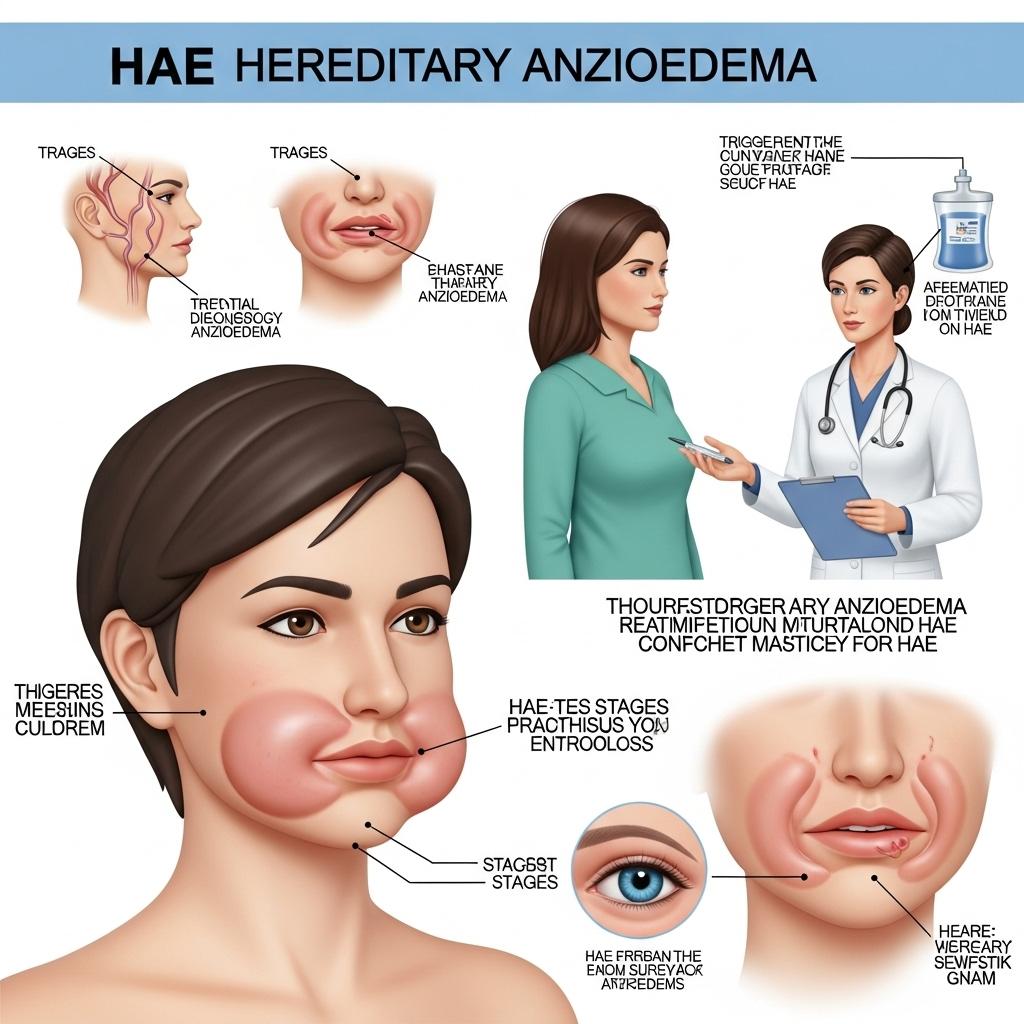Hereditary Angioedema: Transforming Rare Disease Care with Targeted Therapies

Hereditary Angioedema (HAE) is a rare, potentially life-threatening genetic disorder characterized by recurrent, unpredictable swelling episodes affecting the skin, gastrointestinal tract, and airway. It is caused by deficiencies or dysfunction of C1 esterase inhibitor (C1-INH), leading to excessive bradykinin production—a key mediator of vascular permeability. Advances in targeted therapies have dramatically improved disease control and quality of life for individuals living with HAE.
Request a sample copy of the CI report at:
https://www.datamintelligence.com/strategic-insights/ci/hereditary-angioedema-hae
Pathophysiology: The Bradykinin Connection
HAE is most commonly inherited in an autosomal dominant manner and classified into three types:
1. Type I (85%): Low levels of functional C1-INH
2. Type II (15%): Normal levels of dysfunctional C1-INH
3. HAE-nl-C1-INH: Normal C1-INH levels and function, often involving other mutations (e.g., FXII)
The unregulated kallikrein-kinin pathway results in excessive bradykinin, which causes fluid to leak from blood vessels into surrounding tissues—triggering angioedema without urticaria or itching.
Clinical Presentation and Diagnostic Approach
HAE attacks vary in location, frequency, and severity. Common features include:
Non-pitting swelling of face, hands, feet, or genitals
Abdominal pain, vomiting, or diarrhea (from bowel wall edema)
Laryngeal swelling, which can obstruct airways and be fatal
Diagnosis is confirmed by:
Low C4 levels during or between attacks
Low C1-INH antigenic levels (Type I)
Normal antigen but low functional C1-INH activity (Type II)
Genetic testing for rare subtypes (HAE-nl-C1-INH)
Early diagnosis is crucial to reduce morbidity and prevent airway emergencies.
Acute Treatment: Rapid Attack Control
Management of acute attacks aims to halt swelling progression. Approved on-demand treatments include:
Plasma-derived or recombinant C1-INH concentrates
Bradykinin receptor antagonists (e.g., icatibant)
Kallikrein inhibitors (e.g., ecallantide)
These agents work by replacing deficient C1-INH or interrupting bradykinin signaling. Prompt self-administration is encouraged, and all patients should carry emergency medication.
Prophylaxis: Preventing Recurrence
Long-term prophylaxis is recommended for patients with frequent, severe, or life-threatening attacks.
Options include:
* Subcutaneous C1-INH (e.g., Haegarda)
* Kallikrein inhibitors (e.g., lanadelumab)
* Oral therapies like berotralstat
These agents offer sustained control with improved convenience and fewer side effects than older androgen therapies. Individualized risk-benefit assessment guides the choice of prophylaxis.
Living with HAE: Multidisciplinary and Preventive Care
Comprehensive care involves:
1. Education on symptom recognition and trigger avoidance (e.g., trauma, stress, infections)
2. Genetic counseling for affected families
3. Regular monitoring and treatment optimization
4. Psychosocial support to address anxiety and improve adherence
Patient advocacy and telemedicine services are helping expand access to life-saving therapies globally.
Request a CI consultation at:
https://www.datamintelligence.com/strategic-insights/ci/hereditary-angioedema-hae
Research and Innovation: The Next Frontier
Emerging therapies are exploring:
* Gene-silencing approaches (e.g., antisense oligonucleotides targeting kallikrein)
* CRISPR-based gene editing
* Long-acting monoclonal antibodies
* Improved oral formulations for better compliance
The aim is to achieve full attack prevention and potentially modify the disease course, reducing reliance on lifelong therapy.
About DataM Intelligence
DataM Intelligence 4Market Research LLP delivers real-time competitive intelligence across autoimmune, immunologic, and rare disease spaces. Our insights span clinical pipelines, regulatory benchmarks, and commercialization strategies for stakeholders in global life sciences.
🔗 Visit: www.datamintelligence.com
- Art
- Causes
- Crafts
- Dance
- Drinks
- Film
- Fitness
- Food
- Games
- Gardening
- Health
- Home
- Literature
- Music
- Networking
- Other
- Party
- Religion
- Shopping
- Sports
- Theater
- Wellness


